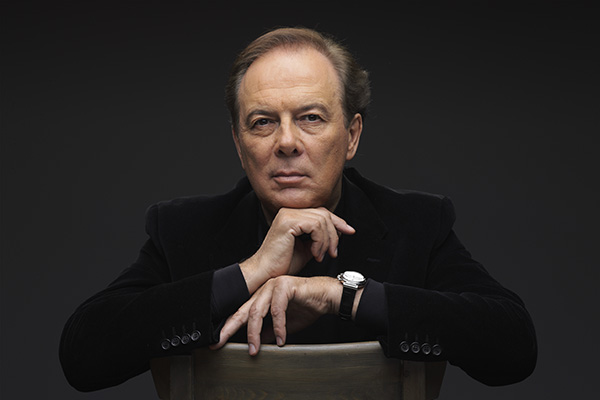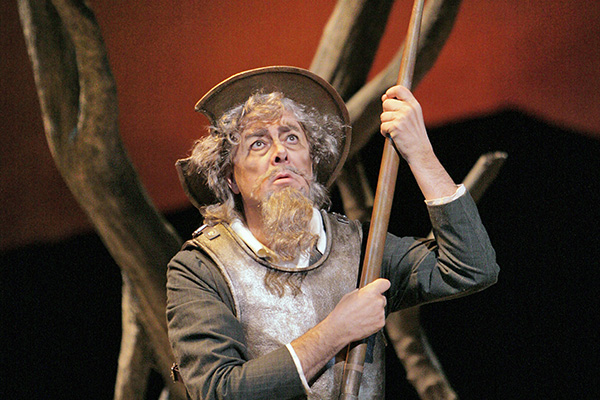-
Ferruccio Furlanetto and Don Quichotte — A profound connection.
By Danielle D'OrnellasPosted in Don QuichotteBy Gianmarco Segato, Adult Programs Manager

It’s simply impossible for an opera company to present Massenet’s Don Quichotte without an artist who possesses the requisite gravitas, charisma and noble vocalism necessary to master the title role’s considerable musical and histrionic demands. In Ferruccio Furlanetto, who makes his greatly anticipated COC debut in the title role, the COC not only has the world’s leading Don Quichotte but a singer whose legendary 40-year career has established him as one of the greatest singing actors of his generation. His vocal pedigree is impeccable – his rich, velvety, espresso-hued timbre marks him as the natural successor to his idol, the great Italian bass, Cesare Siepi, one of the finest singers of the post-war period. As Furlanetto notes, “For me, [Siepi] had the most beautiful voice there has ever been, the most Latin, the most beautiful colour, so I wanted to follow the same path as him. He was an extraordinary Figaro, the best Giovanni, so I worked and worked in preparation for these roles.”
Furlanetto’s artistic lineage is also strongly linked to past greats, including the Bulgarian bass Boris Christoff, with whom he worked as a young singer in Verdi’s Don Carlo, taking the small role of the Monk to his elder colleague’s King Philip, the role now considered by many to be Furlanetto's greatest. His unconditional admiration for, and direct experience with, his illustrious predecessors – Christoff’s superb technique, Siepi’s definitive Don Giovanni and the seamless legato of that other great Bulgarian bass, Nicolai Ghiaurov – situate Furlanetto within a continuum connecting past tradition to contemporary performance practice. He emerges as the towering, present-day Italian exponent of the ever-evolving art of great singing.
Perhaps a little surprisingly, Furlanetto’s performing roots were in the Italian rock scene of the 1960s when the British Invasion was at its peak. He soon migrated to the classical realm and began formal vocal studies with Ettore Campogalliani, the legendary northern Italian voice teacher who also counted Luciano Pavarotti, Mirella Freni and Renata Scotto among his students. From Campogalliani he learned to master “economy of breath and interpretation within a phrase – to do a phrase from beginning to the very end without giving the impression you are working and then, in between, you have to paint with the colours of your voice what you are saying.” He also gained valuable lessons on stage deportment: “I was stiff, and my teacher said – free those hands, leave the rest of your body completely relaxed! This is extremely important when you become a character on stage – the voice is directed by the mind but you need your body to inhabit a character and it doesn’t help if you are stiff!”

Ferruccio Furlanetto in the San Diego Opera's 2009 production of Don Quichotte.From these initial, relatively modest acting tips, Furlanetto honed his thespian skills to the degree that he now privileges roles for which “there is an important vocal component. To inhabit a character like King Philip, Don Quichotte or Boris Godunov, vocality is fundamental but even more so is the capability to be an acting singer.” The Italian basso readily admits that, currently, these are his three favourite roles and if someone offered him “a contract to do them for the rest of my career, I’d sign it straightaway!” The betrayed Philip and the dying Boris and Don Quichotte are all acting showcases. For Furlanetto, “to represent on stage a dying character gives you an infinite possibility of interpretations of emotional involvement. And when it comes to Boris and Don Quichotte, all this is lifted to the nth degree.”
Of his favoured trio, Don Quichotte is the role that gives him the highest satisfaction. “Quichotte is eternally compelling because he is what every man should be, ideally, at least for a few moments in his life: a man full of humanity, love, tenderness and appreciation for life. Musically, everything about this role is very touching and beautiful – it can reach moments of absolute poetry. Whenever and wherever I’ve sung Don Quichotte you cannot imagine the results we've had with audiences who receive it with tremendous joy and satisfaction.” Furlanetto stresses that roles like Philip, Boris and Don Quichotte are “final targets you have to interpret when you have the maximum experience both vocally and as an actor, where the maturity of a singer is more important than anything else. It is absolutely fundamental to wait 10 years rather than to do it too soon.” Accordingly, he didn’t start learning Don Quichotte until he was in his early 50s. “In this opera you are constantly in contact with the concept of death. You approach these kinds of matters much better and in a more interesting way when you are less young – it’s something that goes together with your experience of life, it’s as simple as that. Roles like Don Quichotte, first of all I do them for myself, for the joy that I receive when I sing them, which goes first to my own heart and then, eventually, to the audience’s heart; this is pure happiness.”
Photos: (top) Ferruccio Furlanetto. Photo by Igor Sakharov; (middle) Ferruccio Furlanetto as Don Quichotte in the San Diego Opera's 2009 production of Don Quichotte. Photo by Cory Weaver.
